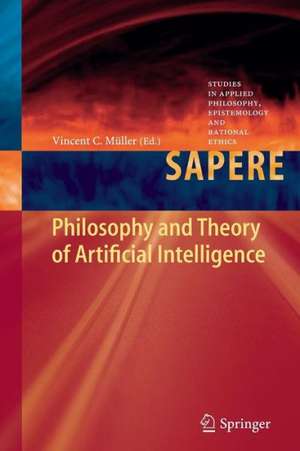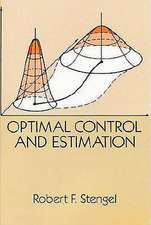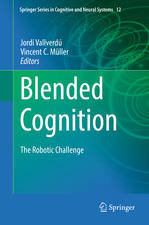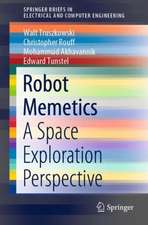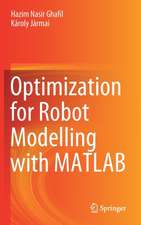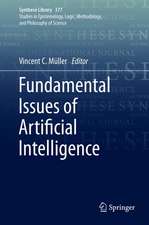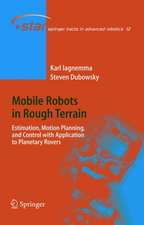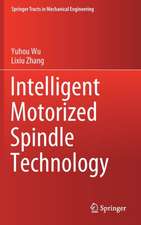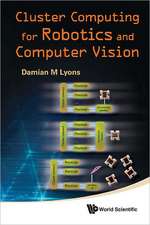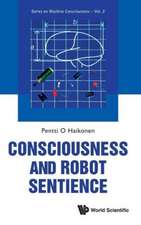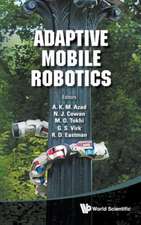Philosophy and Theory of Artificial Intelligence: Studies in Applied Philosophy, Epistemology and Rational Ethics, cartea 5
Editat de Vincent C. Mülleren Limba Engleză Paperback – 20 sep 2014
We can re-claim the original vision of general AI from the technical AI disciplines; we can reject classical cognitive science and replace it with a new theory (e.g. embodied); or we can try to find new ways to approach AI, for example from neuroscience or from systems theory. To do this, we must go back to the basic questions on computing, cognition and ethics for AI. The 30 papers in this volume provide cutting-edge work from leading researchers that define where we stand and where we should go from here.
| Toate formatele și edițiile | Preț | Express |
|---|---|---|
| Paperback (1) | 950.96 lei 6-8 săpt. | |
| Springer Berlin, Heidelberg – 20 sep 2014 | 950.96 lei 6-8 săpt. | |
| Hardback (1) | 956.99 lei 6-8 săpt. | |
| Springer Berlin, Heidelberg – 24 aug 2012 | 956.99 lei 6-8 săpt. |
Din seria Studies in Applied Philosophy, Epistemology and Rational Ethics
- 20%
 Preț: 603.90 lei
Preț: 603.90 lei -
 Preț: 397.59 lei
Preț: 397.59 lei -
 Preț: 359.54 lei
Preț: 359.54 lei - 20%
 Preț: 989.96 lei
Preț: 989.96 lei - 24%
 Preț: 787.50 lei
Preț: 787.50 lei -
 Preț: 390.08 lei
Preț: 390.08 lei -
 Preț: 370.88 lei
Preț: 370.88 lei - 15%
 Preț: 641.20 lei
Preț: 641.20 lei - 20%
 Preț: 991.60 lei
Preț: 991.60 lei - 20%
 Preț: 646.95 lei
Preț: 646.95 lei - 15%
 Preț: 653.98 lei
Preț: 653.98 lei -
 Preț: 384.48 lei
Preț: 384.48 lei -
 Preț: 395.47 lei
Preț: 395.47 lei - 18%
 Preț: 1216.95 lei
Preț: 1216.95 lei - 18%
 Preț: 947.50 lei
Preț: 947.50 lei -
 Preț: 388.72 lei
Preț: 388.72 lei -
 Preț: 390.08 lei
Preț: 390.08 lei -
 Preț: 395.09 lei
Preț: 395.09 lei -
 Preț: 394.12 lei
Preț: 394.12 lei - 15%
 Preț: 644.82 lei
Preț: 644.82 lei - 15%
 Preț: 698.15 lei
Preț: 698.15 lei - 18%
 Preț: 1840.91 lei
Preț: 1840.91 lei - 20%
 Preț: 656.84 lei
Preț: 656.84 lei -
 Preț: 389.70 lei
Preț: 389.70 lei - 20%
 Preț: 991.46 lei
Preț: 991.46 lei - 15%
 Preț: 585.73 lei
Preț: 585.73 lei - 15%
 Preț: 711.40 lei
Preț: 711.40 lei - 15%
 Preț: 589.33 lei
Preț: 589.33 lei - 15%
 Preț: 700.42 lei
Preț: 700.42 lei
Preț: 950.96 lei
Preț vechi: 1159.71 lei
-18% Nou
Puncte Express: 1426
Preț estimativ în valută:
181.97€ • 194.58$ • 151.72£
181.97€ • 194.58$ • 151.72£
Carte tipărită la comandă
Livrare economică 18 aprilie-02 mai
Preluare comenzi: 021 569.72.76
Specificații
ISBN-13: 9783642436833
ISBN-10: 3642436838
Pagini: 432
Ilustrații: XIV, 418 p.
Dimensiuni: 155 x 235 x 23 mm
Greutate: 0.6 kg
Ediția:2013
Editura: Springer Berlin, Heidelberg
Colecția Springer
Seria Studies in Applied Philosophy, Epistemology and Rational Ethics
Locul publicării:Berlin, Heidelberg, Germany
ISBN-10: 3642436838
Pagini: 432
Ilustrații: XIV, 418 p.
Dimensiuni: 155 x 235 x 23 mm
Greutate: 0.6 kg
Ediția:2013
Editura: Springer Berlin, Heidelberg
Colecția Springer
Seria Studies in Applied Philosophy, Epistemology and Rational Ethics
Locul publicării:Berlin, Heidelberg, Germany
Public țintă
ResearchCuprins
Computation & Method.- Cognition.- Ethics & Society.
Recenzii
From the reviews:
“This book comprises a very broad and interesting collection of extended versions of papers from the 2011 conference on Philosophy and Theory of Artificial Intelligence. … this book would be a valuable reference for researchers not only from AI and philosophy, but also those working in the vast number of disciplines that influence their development. The philosophical nature of the discussions should appeal to anyone interested in the big picture of where the discipline is headed.” (Gerardo Simari, ACM Computing Reviews, December, 2012)
“This book comprises a very broad and interesting collection of extended versions of papers from the 2011 conference on Philosophy and Theory of Artificial Intelligence. … this book would be a valuable reference for researchers not only from AI and philosophy, but also those working in the vast number of disciplines that influence their development. The philosophical nature of the discussions should appeal to anyone interested in the big picture of where the discipline is headed.” (Gerardo Simari, ACM Computing Reviews, December, 2012)
Textul de pe ultima copertă
Can we make machines that think and act like humans or other natural intelligent agents? The answer to this question depends on how we see ourselves and how we see the machines in question. Classical AI and cognitive science had claimed that cognition is computation, and can thus be reproduced on other computing machines, possibly surpassing the abilities of human intelligence. This consensus has now come under threat and the agenda for the philosophy and theory of AI must be set anew, re-defining the relation between AI and Cognitive Science.
We can re-claim the original vision of general AI from the technical AI disciplines; we can reject classical cognitive science and replace it with a new theory (e.g. embodied); or we can try to find new ways to approach AI, for example from neuroscience or from systems theory. To do this, we must go back to the basic questions on computing, cognition and ethics for AI. The 30 papers in this volume provide cutting-edge work from leading researchers that define where we stand and where we should go from here.
We can re-claim the original vision of general AI from the technical AI disciplines; we can reject classical cognitive science and replace it with a new theory (e.g. embodied); or we can try to find new ways to approach AI, for example from neuroscience or from systems theory. To do this, we must go back to the basic questions on computing, cognition and ethics for AI. The 30 papers in this volume provide cutting-edge work from leading researchers that define where we stand and where we should go from here.
Caracteristici
This book presents cutting-edge research work on computing, cognition and ethics for artificial intelligence Papers included in this book were presented at the Philosophy & Theory of Artificial Intelligence conference, held in October 3-4, 2012 in Thessaloniki, Greece Written by leading experts in the field
